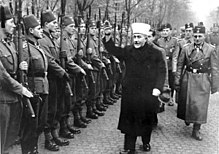Part of why the Serbs feel so victimized in the Balkans, but also why the Albanians feel the same way.
 |
| Italian Occupation of Albania. By Kingdom of Italy - Axis History Forum, Public Domain, https://commons.wikimedia.org/w/index.php?curid=7371499 |
This is not a story we hear too often in the discussion about Serbia and Kosovo. It reminds me of the reasons for the current "denazification" excuse for the ongoing Russian invasion of Ukraine and the inherent cultural violence in the application of military force. This is despite Ukraine having a Jewish president of Ukraine whose grandfather lost all of his brothers in the Holocaust. The Serbs and the Russians had some deeply interesting and painful encounters with Nazi regime forces and with their collaborators. This does not mean that these past aggressions are modern justifications for ethnic cleansing, genocide, and arson today by the victim nations of WWII against the aggressor nations of WWII. Being a victim in one period does not justify being an oppressor in another timeframe. Eliminating a past threat for current geopolitical imperatives is not a justification at all times. However, as a geopolitical risk analyst, I have to be able to understand how Putin views himself as a patriot during the chaos of the Soviet collapse, how and more importantly why the Serbs and the Russians see themselves as good guys, and how history from 80 years ago is still impacting the region in terrifying ways, such as storylines and justifications for cultural and military violence against people who never had anything to do with the wartime atrocities and mafioso crimes of this 1,500 man battalion. We sometimes read official histories written by the government of the victors and we don't often talk about stories told within families about their own personal suffering which is the real motivation for someone to fight and go to war. Don't let mom get raped. Don't let your uncle's sacrifice in the last war go to waste. Protect your sisters. The house was burned by _____ group. Don't let them do it again. But it is telling how when wars start, and atrocities spiral out of control, we don't look back at the reasons these people happily burned down the homes of their settler neighbors, took back their schools, attacked their 30,000 neighbors, and took revenge. Without ending the cultural and structural violence that started the vicious cycle in the first place, we can no more start the process of healing, without the disruptive trio of revenge, military violence, and back-sliding into old conflict styles.
Background[edit]
On 7 April 1939, five months prior to the outbreak of World War II, the Kingdom of Italy invaded Albania. The country was overrun in five days, and Italian King Victor Emmanuel III accepted the crown offered by the Parliament of Albania. The Royal Albanian Army was incorporated into the Royal Italian Army and a viceroy was appointed to administer the country as a protectorate.[1] Following the Axis invasion of Yugoslavia on 6 April 1941, Italian Albania was expanded to include adjacent parts of the Kingdom of Yugoslavia incorporated mainly from the Yugoslav banovinas (regional subdivisions) of Vardar and Morava.[2] Most of Kosovo was annexed to Albania, and in the beginning, Albanians living there enthusiastically welcomed the Italian occupation.[3] Some Kosovo Albanians even suggested that Albanians were "Aryans of Illyrian heritage".[4] Although officially under Italian rule, the Albanians in Kosovo were given control of the region and encouraged to open Albanian-language schools,[5] which had been banned by the Yugoslav government.[6] The Italians also gave the inhabitants Albanian citizenship and allowed them to fly the flag of Albania.[5] The Royal Italian Army expelled most of the Serbs and Montenegrins that had settled Kosovo during the interwar period.[7] The Kosovo Albanians despised the Serbs for the oppression they had experienced at their hands during the Balkan Wars, World War I, and under Yugoslav rule.[8] They took advantage of their changed circumstances, attacked their Serb neighbours, and burned the homes of as many as 30,000 Serb and Montenegrin settlers.[5]
Albania remained occupied by Italy until its surrender to the Allies in September 1943.[9]
https://en.wikipedia.org/wiki/21st_Waffen_Mountain_Division_of_the_SS_Skanderbeg
This is also a really complicated history. Note the Mufti of Jerusalem, a noted anti-Semite blessing the 13th SS Division. Someone who I really don't like.


Comments
Post a Comment